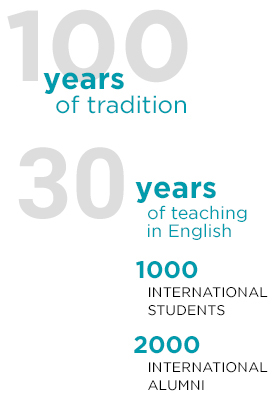
Introduction
The Medicine program at PUMS is an offer for undergraduate applicants leading to a professional degree of Doctor of Medicine, opening doors to medical licensing on all continents.
| Program | Medicine |
| Qualification awarded | Doctor of Medicine (M.D.) |
| Type of course | Long-cycle undergraduate-entry |
| Language of instruction | English |
| Duration | 6 years (12 semesters) |
| ECTS points | 360 |
| Program start | September |
| Tuition-based program. | |
Our high standards of teaching are in line with American, European and other international requirements so that you can be well prepared for licensing exams, wherever you decide to take them. Each class is carefully thought-out and combines a perfect mix of theoretical knowledge, practical training and simulation. For 30 years we have been educating students from around the world and we are good at it.
We provide modern education based on the experience of working in various health service environments. The University owns 6 clinical hospitals, a hospice and a state-of-the-art medical simulation center.
We are located in the European Union, which means that our graduates have the liberty to pursue their professional and research careers both within and outside of Europe and the various pathways of our alumni prove that they enjoy success, be it in Canada, the US, Norway, Taiwan, the UK or elsewhere.
We realise that contact with patients is a very important part of education. This is why beginning from the 2nd year of your studies we make it possible for you to have contact with patients in our clinics. Additionally, if you decide to become a volunteer, you will have an opportunity to take an active part in clinical duties by assisting your lecturers in medical procedures or surgeries.
We do our best to ensure that your studies are the beginning of a great adventure with medicine and a solid foundation for your future professional career.
From cell-level biological mechanisms to complex handson practice in hospital wards – the program is structured in a manner that gradually introduces you to the world of modern medicine. It will give you the complete practical skill set of a physician with in-depth knowledge of biochemical processes taking place in the human body, mechanisms of disease and the functioning of drugs and therapies.
year one
Year 1 lays the basic science groundwork for medical studies. Laboratory practice and theoretical classes in courses like anatomy, physiology or genetics, will give you excellent understanding of the structure and function of a healthy human body and a great insight into biochemical processes inside a living organism. It is a review and further exploration into what was taught in secondary school and its uses in medicine.
year two
year three
While finishing the basic science coursework, you will find out what can go wrong when healthy structures and processes are disturbed and how it translates to the dynamics of a range of diseases and conditions, as well as what are the best pharmacological and therapeutic options available. You will understand mechanisms of disease and treatment interventions. At the end of the year you will take part in the Comprehensive Basic Science Review course, administered in cooperation with the Kaplan Inc., concluded by a comprehensive examination.
year four
The fourth year marks the start of the clinical part of the studies. You will begin rotations in internal medicine, surgery, pediatrics, psychiatry and radiology. You will spend your hospital shifts in groups of 5-6 students per one doctor-tutor, learning the ins and outs of the daily work in each type of ward, performing interviews and taking the patient's history, practicing procedures and assisting in surgeries. You will also review cases and discuss the theoretical bases for each specialty
year five
Year five sees the continuation of clinical rotations with final exams in surgery, obstetrics and gynecology, internal medicine, pediatrics and neurology. You will gain experience as a hospitalist, learn how to conduct clinical procedures and keep training in your professional skill set.
year six
You will complete the rest of mandatory clinical rotations and subspecialties, and become familiar with such interesting fields as forensic medicine, neurology, oncology, and infectious and tropical diseases. If you are thinking of practicing medicine in the US or Canada, this is also when you will complete your elective clinical rotations.
Would you like to become a family doctor with your medical practice? Or perhaps it is surgery that you find really fascinating? Are you wondering how to become a good and valued doctor? Are you looking for a profession that will give you satisfaction and social recognition? Are stable career and financial success important to you?
Join us and make your dreams come true!
PUMS diplomas are recognized worldwide.



